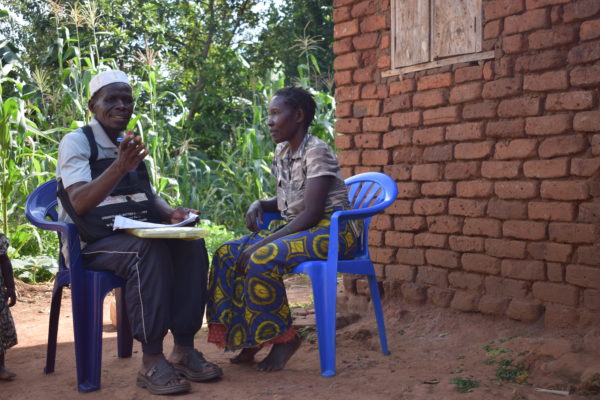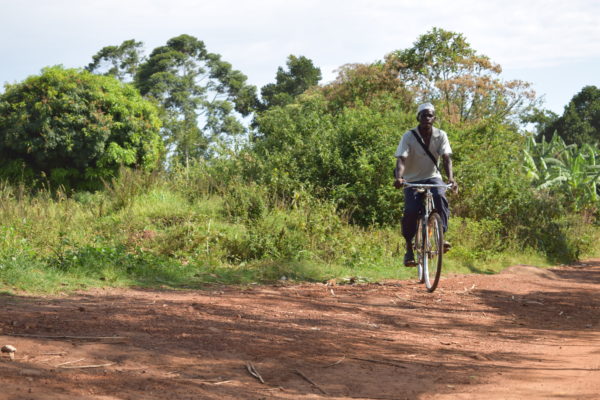A Passion to Serve: Para-Social Workers Offer Critical Support to Vulnerable and HIV+ Children across the Continuum of Care
Under the USAID/Uganda Better Outcomes for Children and Youth in Eastern and Northern Uganda, WEI/Bantwana and its government and locals partners build the resilience of vulnerable children and families through proven, integrated social protection models of care that address children’s multiple vulnerabilities across the HIV continuum. To date, 127,000 children and their families across 20 districts have benefited from the program.
For the last three years, Swaib Balisanyuka has served vulnerable children, including children living with HIV/AIDS and their caregivers, in Buwaaya Village, Mayuge District in eastern Uganda.
“I was deeply touched by the situation people living with HIV/AIDS were going through, especially the children. Many were being neglected, stigmatized, and isolated by their very own family members. In my village, people did not know the importance of HIV testing. I felt the need to support them” Swaib recalls.
Swaib’s opportunity to effect change came in 2015 when, upon the recommendation of local council leaders, a local community organization selected him to be an Expert Client, where he could use his own experience as an HIV+ man to support others affected by HIV.

Based on his reputation in the community, in 2016, Swaib was invited by local government to be trained as a parasocial worker. The two week training was delivered by government with technical support from the Bantwana Initiative of World Education, Inc. (WEI/Bantwana) under the USAID/Uganda Better Outcomes for Children and Youth in Eastern and Northern Uganda project (BETTER OUTCOMES), Through the parasocial worker training, Swaib built his skills in child protection, statutory reporting protocols, and referral pathways. Following the parasocial training, Swaib became eligible to participate in BETTER OUTCOMES HIV-sensitive case management training.
HIV-sensitive case management training further strengthened Swaib’s skills in child protection and specific issues related to HIV, while introducing a systematic seven-step case management and referral pathway process that includes case planning and monthly case conferences. Case conferences bring together government protection and health stakeholders, police, CSO and community cadres like parasocial workers to address service provision bottlenecks, ensure children receive services, and close cases. Through the case management training, Swaib strengthened his assessment skills, including HIV screening, case planning, referrals, and communication approaches for engaging caregivers and children around sensitive topics like neglect, abuse, HIV and gender-based violence. The training reinforced the importance of confidentiality and consent, particularly for HIV+ children and families, and explored the kinds of psychosocial support HIV+ children and caregivers need to support positive coping skills and address issues related to disclosure, stigma, and adherence.
“I’m a para-social worker, but I am also HIV+, so I serve as an example to the community. When I refer to my real-life experiences and what I have achieved by adhering to antiretroviral therapy, it helps people who are also HIV+ to cope as well,” Swaib says.
As an HIV+ para-social worker, Swaib is able to build trust among his HIV+ clients, while also encouraging his clients who are unaware of their HIV status to be tested for HIV. Following the case management training, Swaib began to attend monthly case conferences which help him monitor and close cases as well as to address obstacles to service provision.
Swaib understands the importance of confidentiality and the stigma that people living with HIV experience; he takes care to reassure clients that he is trustworthy with their information and makes sure to request their consent. He works closely with health centers to follow up with his HIV+ clients that miss appointments. Swaib helps clients travel to the health centers to pick up their medication, and, in some cases, he makes home deliveries to those who are too weak or who are unable to reach the distribution points.
“I deliver drugs to my clients who are critically ill and cannot reach the health center; they can now inform me in a timely manner when they are having challenges with adherence because they cannot pick up their medication. And if they fail to pick up their drugs, I pick them up on their behalf. The [BETTER OUTCOMES] project eased transport by providing me with a bicycle, which allows me to better support my clients who are unable to reach the health centers,” he explains.
Through an innovative Closed User Group (CUG) in-service phone network, BETTER OUTCOMES and child protection actors are improving response and service delivery around critical protection issues. The CUG complements and strengthens Uganda’s Child Helpline by providing a free connection between Child Helpline operators and para-social workers, like Swaib, at the community level who can follow up on reports. The CUG also enables Swaib to consult with child protection actors on challenging cases.

“The combination of the CUG phone line and the skills and knowledge that I learned through case management has helped me to feel more confident in my work. I now feel more at ease approaching families and engaging in discussions on child neglect and healthy living. The CUG helps me more easily link with child protection centers, service providers, and the local government to link and refer children for scholastic materials, health services, nutrition services, legal aid, or child protection services. I am very grateful for the contribution that I make towards the plight of these children,” he explains.
Today, Swaib sees a change within his community: He observes that more people are now open to being tested for HIV, following effective sensitization and counseling from someone that they trust. “In this village, children did not want to study and did not understand the value of education, and neither did their parents. I now see children back in school and parents who are more supportive of education for their children” he says.
Swaib finds satisfaction from supporting his clients with counseling through home visits. He always makes sure to follow up on referrals with his households to make sure that services are received.
“I see HIV+ children back in school, and I observe that irregular school attendance has been minimized in my area of operation,” he adds, “Seeing the positive effects of my work motivates me to carry on.”
